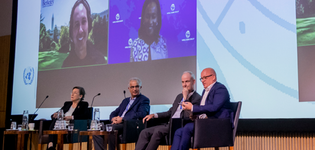Blog
The conflict in Ukraine - the role of civilians
While there is much to discuss about the geopolitics of the Russian invasion of Ukraine, let's not forget the men, women and children of Ukraine who now face utter devastation to their lives – they matter. They matter not only because they will suffer unmeasurable horrors and deprivations, but because they may also shape the course of the conflict.
Devastating effects of protracted conflict
There are several aspects of this invasion that will affect civilians disproportionately hard. First, the offensive escalated very quickly, and many are now fleeing in whatever way possible. UNHCR have accounted for more than 500,000 refugees leaving Ukraine since Thursday and are predicting this number to rise to 4 million over the next weeks.
Second, the focus of attacks on cities means the number of civilian casualties will rise fast given the known devastating effects of urban warfare in highly populated cities. This is a common war strategy, which is intended to displace and depopulate. Amnesty International has already reported several indiscriminate attacks by Russian forces on civilian targets.
Third, brave resistance from Ukrainians and less effective than expected Russian force means that this war may soon become a protracted conflict.
While the length of the invasion and its consequences for Ukraine and its neighbours are yet to be seen, we need to be prepared and start planning for the long term. Protracted conflicts, a likely scenario at the moment for Ukraine, exercise a heavy toll on civilians, as shown by decades of research on armed conflict. Inflation, disruption of markets and shortages of food, fuel and other essential goods will cripple local economies and people’s lives. Trauma and loss will ruin families and local communities. As social networks deteriorate and solidarity fades due to displacement, misinformation and sheer weariness, local conflicts and local cleavages may start emerging and social trust and cooperation could be eroded.
Civilians have agency
However, civilians are not only passive victims of armed conflict. They have agency. Across many conflicts, over and over, civilians organise themselves to survive, resist and rebel. This is also the case in Ukraine where many are taking up arms and fighting. The people of Ukraine have demonstrated their desire for independence and freedom in several referenda, protest movements and democratic elections since the Orange revolution in 2004 and Euromaidan in 2014. In Russia itself, thousands of citizens are protesting against the deplorable actions of their government despite enormous personal costs.
Research has shown that despite its horrors wars often also breed pro-social behaviour, resistance and extraordinary resilience. Of course, civic resistance is not enough nor a solution against untold destruction of lives and livelihoods by massive military forces. But civil resistance matters. Resistance forces mattered during WWII and across many insurgencies from Vietnam in the 1970s to Lebanon, Colombia, Iraq and Syria in the 2000s. Asymmetric insurgencies, especially in urban settings and involving non-military actors, too, are devastating for civilians, who will also face numerous difficulties in face of new surveillance technologies. Still, a scaling up of civilian insurgency into a sustained resistance is a clear possibility in Ukraine. Arms are being given to ordinary citizens to defend themselves and their communities. As fighting continues, it is unavoidable that various militia, civilian defence forces and vigilante groups will form. This militarisation of civil society brings its own challenges.
Avoiding the evolution of this Russian invasion into a protracted insurgency is of paramount importance. But if that happens, civilians need to be protected and supported – either if part of resistance forces, as passive standbys, as deliberate targets of armed attacks or as victims of indiscriminate violence. A combination of continued diplomatic efforts (fast exhausting), imposition of sanctions (growing in impact) and increased military aid to Ukraine seems to be the bulk of international response. While these efforts continue, civilians will be used by Russia as pawns, and as weapons of war. But many will also rise and resist. Effective humanitarian intervention, open borders to refugees and ways of strengthening civil society movements are all key to the protection of Ukrainian citizens.
The views expressed in this piece are those of the author(s), and do not necessarily reflect the views of the Institute or the United Nations University, nor the programme/project donors.
 Join the network
Join the network












